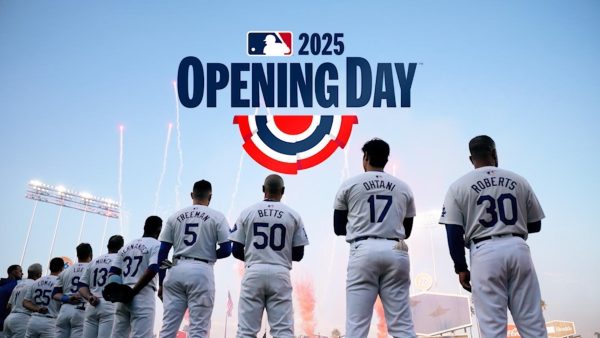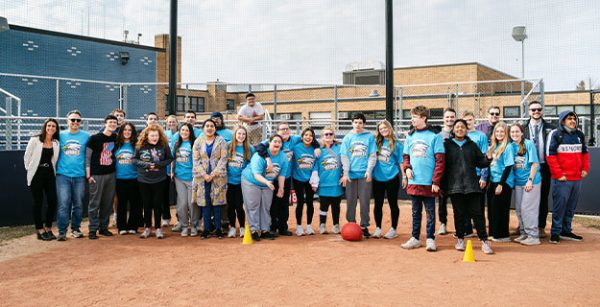Is There No Such Thing As A Student Athlete?
High school and college students in Bethpage and across the land are told by their coaches “You’re a student-athlete. And student comes before athlete.” But how many students actually follow that advice these days? In the past couple of years, select college students have taken the opposite route, declining to finish their educations and instead starting an athletic career in the pros or elsewhere.
Andrew Wiggins was the first overall pick in the 2014 NBA Draft. Wiggins just finished his freshman year of college and already planned on becoming a professional basketball player. Wiggins is only 19 years old, and he’s going to the NBA with no degree or educational background, which could backfire if his career fails to progress, or if he’s injured. For example, if Wiggins wants to invest his money or start a business later in life, he will arguably have no idea what to do.
In recent years, the NBA has implemented a rule that in order to be drafted, college players must finish their freshman years. While that is better than allowing high school graduates to enter the NBA, that’s not good enough. Most of the players are 19-20 years old with no education past a high school diploma. All of those players get full-ride scholarships to great colleges and seemingly take their education for granted.
Lawrence Moten is a good example of an educational nightmare. Moten had a successful career in the NBA, but let his talents take the place of his education. He got a full ride scholarship to Syracuse University, and according to eyewitnesses, rarely attended class. He was famous in Syracuse, so his teachers passed him in all of his classes so he could play basketball. If the teachers failed him, Moten would’ve realized the value education has. Moten took education for granted, and now that he’s retired in his early 40s, and one wonders whether he has the smarts to manage his money.
“When I went up to visit Syracuse University, I saw Lawrence Moten walk into the cafeteria with an entourage. He was a celebrity on campus but never went to class. All the other students knew that he passed his classes without doing anything. I don’t get it,” said Mr. Malossi, English teacher at Bethpage.
One of the most important reasons why college athletes should wait to be drafted is to mature. A perfect example of this would be the notorious Johnny Manziel. Ever since he became famous at Texas A&M University, he has gotten himself in a world of trouble. From excessive partying and temper tantrums to other inappropriate off the field issues, Manziel has proven he is not ready for the real world.
The main reason college athletes leave for professional sports is for the money. Nineteen or twenty-year-olds don’t need to sign a multi-million dollar contract; college students may be legally adults, but they’re kids when it comes to money. Once students see money, they are more likely than an older person to immediately spend it on the most appealing items. It’s a risk.
A perfect example of immaturity and irresponsibility is, again, Johnny Manziel. Once Manziel was drafted by the Cleveland Browns, he spent $2,000 dollars on alcohol for his Texas A&M classmates at a bar close by the university to celebrate. This led to a controversy between Manziel and his coaches. If he’d stayed in school, he would have learned to manage and understand the value of money, which might lead to better choices later. It also could have raised his draft stock, because no team wants an irresponsible, immature kid on their team, regardless of talent.
Not everybody agrees with this. Mr. McCoy, assistant football coach at Bethpage, took the opposite view of the scenario with some very valid points.
The Eagle’s Cry: If one of your football players had a good football scholarships, would you encourage him to go pro right away or wait to graduate with a degree?
Coach McCoy: “I think it all depends on the situation. Obviously, we have not had a chance to coach a kid like LeBron James in Bethpage High School. His maturity and physical attributes allowed him to achieve greatness right away. If I had a student like that, I would tell him go pro. However, in the world of football, athletes are bigger, faster, and stronger than ever before, so the more time an athlete has to develop both mentally and physically, the better off he would be.”
The Eagle’s Cry: “Do you think student athletes need to mature in college to be ready for the professional sports world? If so, why?”
Coach McCoy: “Maturity is something that, no matter what job we apply for out of college, develops with experience and time. If you asked all teachers at Bethpage how has maturing helped your teaching, I would think close to 100% of us would say with age we have become better teachers with age, mastering our craft over the years. We also have a longer ‘playing’ career (20-30 yrs.) than most athletes. An average NFL player’s career is close to three years. So if an athlete could cash in from the age of 22-25 and make hundreds of thousands, if not millions of dollars, why shouldn’t he? It’s what he does with his money that will give him a prosperous life after the game ends.”
The Eagle’s Cry: “As a teacher, do you sometimes feel that student athletes take their education for granted? If so, how do you think that can hurt them in the future”
Coach McCoy: “As for athletes taking their educations for granted, I think most students do. Honestly, how many kids try their very best in class? How many go home and study? How many copy HW/Labs/ etc? I don’t think it matters if a kid plays violin, sports, or any other activities. Most students do not maximize their talent to the best of their abilities. Work ethic is something that has declined, and this causes our youth to want handouts instead of opportunities to work hard and achieve greatness.”

If there were an entrée named after Bethpage High School senior Danny Ranz, it would be a “charisma sandwich,” with a side of “interesting fries,”...











James Caporuscio • Sep 4, 2021 at 3:11 am
Thanks for the informative perspective on this controversial topic! From what I’ve read, I sure hope Wiggins becomes a superstar in the NBA.